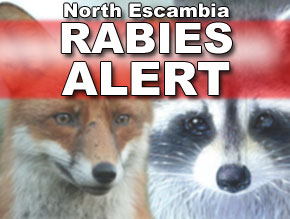Rabies Alert Extended For North Escambia; More Rabid Animals Found
September 29, 2009
A rabies alert for NorthEscambia has been extended after three more animals have been found with rabies.
 The original alert, issued at the end of August was issued after one person was bit by a rabid fox and two raccoons that bit dogs tested positive for rabies. But now that three more rabid animals have been found in North Escambia, the rabies alert has been extended until November 29.
The original alert, issued at the end of August was issued after one person was bit by a rabid fox and two raccoons that bit dogs tested positive for rabies. But now that three more rabid animals have been found in North Escambia, the rabies alert has been extended until November 29.
The Escambia County Health Department received laboratory-confirmation of rabies in a skunk and two raccoons. The skunk and raccoons were sent for testing after interacting with pets and, in one case, a pet owner. These positive tests are in addition to the rabid animals that prompted the August alert.
The rabies alert is for all of North Escambia, from Muscogee Road north to the Alabama state line, including all areas between the Escambia and Perdido rivers north of Musocogee Road.
“Rabies will kill humans and their pets if it is not treated,” said Dr. John Lanza, director of the Escambia County Health Department. “I urge residents to keep their pets vaccinated, to stay away from wild animals, and to take basic precautions to keep wild animals from coming to your home.”
Escambia residents should be aware that rabies is present in the wild animal population and domestic animals are at risk if not vaccinated. The public is asked to maintain a heightened awareness that rabies is active in North Escambia, according to the health department. Alerts are designed to increase awareness to the public, but they should not give a false sense of security to areas that have not been named as under an alert.
An animal with rabies could infect other wild animals or domestic animals that have not been vaccinated against rabies. All domestic animals should be vaccinated against rabies and humans should avoid all wildlife contact, especially with raccoons, bats, and foxes.
Rabies is a disease of the nervous system and is usually fatal to warm-blooded animals and to humans. The only treatment for human exposure to rabies is rabies-specific immune globulin and rabies immunization. Appropriate treatment started soon after the exposure will protect an exposed person from the disease.
The following advice is issued:
- All pets should have current rabies immunizations.
- Avoid contact with all wildlife, especially raccoons, bats, and foxes.
- All persons with any unusual exposure incident, or bites, with a wild animal should be evaluated by a physician to determine their need for treatment.
- For general questions pertaining to rabies in animals, contact the Escambia County Health Department’s Environmental Health Division at (850) 595-6700.
- Secure outside garbage in covered containers to avoid attracting wild animals.
- Do not leave pet food outside as this practice also attracts other animals.
- For questions regarding the health of an animal, contact a veterinarian.
- Veterinarian staff and animal control staff should be alert for animals encountered with signs suspicious for rabies and contact the Escambia County Health Department’s Environmental Health Division at (850) 595-6700.
For further information on rabies, go to the Florida Department of Health website: http://www.doh.state.fl.us/disease_ctrl/epi/diseases.htm or contact the Escambia County Health Department, Environmental Health office at (850) 595-6700.
Comments
2 Responses to “Rabies Alert Extended For North Escambia; More Rabid Animals Found”



Yes, we have some information about this at the Department of Health and you can also call the Escambia Health Dept Div. of Environmental Health at 595-6700. If you think your pet has been exposed, and your pet is not current on their rabies vaccination, call your veterinarian. You are safest if you avoid all contact with wild animals. To answer your question about the signs/symptoms — animals with rabies may act differently from healthy animals (but if varies from animal to animal so if you are worried that your pet may have been exposed, call your vet). Wild animals may move slowly or may act as if they are tame. A pet that is usually friendly may snap at you or may try to bite. Some signs of rabies in animals are: changes in behavior; general sickness; problems swallowing; increased drooling; aggression. Remember, though, it’s best not to have any contact with wild animals. Molly Payne-Hardin (Escambia Co. Health Dept.)
does anyone know the symptoms or signs or an animal that has rabies??